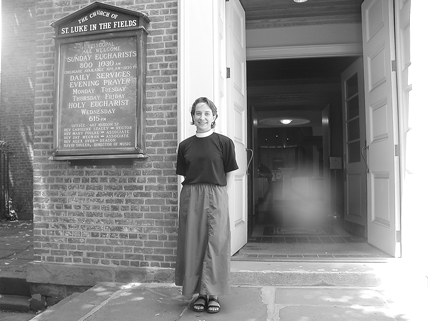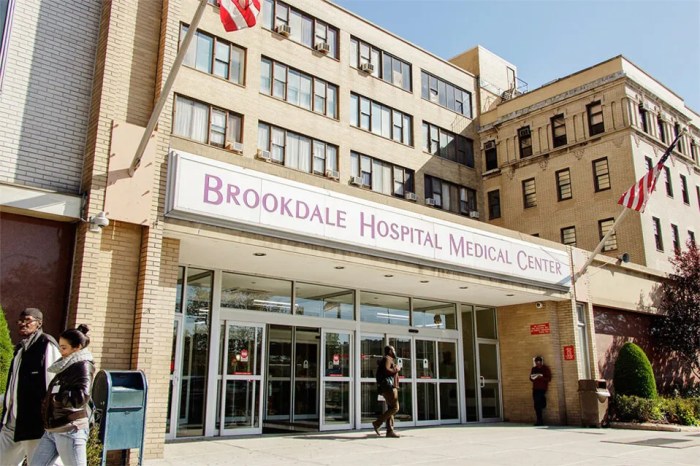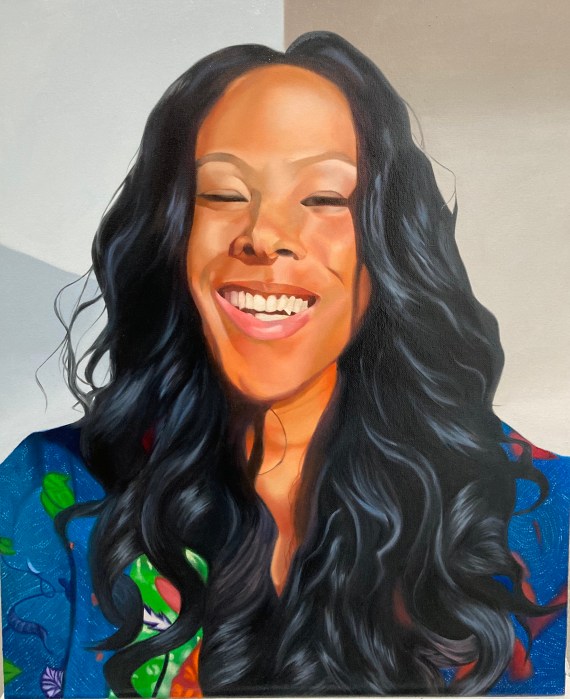Mary Foulke’s ministry informed by spiritual struggle common to all
Mary Foulke’s sermon on the fourth Sunday of Lent this past spring convinced me that she is someone I wanted to interview. Foulke is an Episcopal priest at St. Luke in the Fields in Greenwich Village. An out lesbian, her presence before the congregation is powerful, even profound.
On that Sunday, Foulke spoke with great passion about issues directly affecting the lesbian, gay, bisexual, and transgender community. She was particularly moving when she ventured her interpretation of the risk that the worldwide Anglican Communion, which includes the American Episcopal Church, might splinter, largely due to a heated debate over the role of gays in its hierarchy.
“The schism that is so feared or threatened occurred long ago,” Foulke said. “We are now in the midst of healing, even if it doesn’t feel that way.”
It can seem at times that Foulke, who is 42 years old, only sees good news when many of us fear that tragedies are about to happen, hurdles are about to be mounted.
When Bishop Gene Robinson was installed as the first openly gay Episcopal bishop, in New Hampshire in 2003, there were dire predictions about how this would affect not only the church in the United States but around the world. Anglican bishops in Africa have been particularly critical of the actions of the American Episcopal Church.
In a recent effort at quieting the debate, Rowan Williams, who as archbishop of Canterbury is the leader of the Anglican Church worldwide, suggested that only chaste gay and lesbian clergy can enter into British civil unions, though in offering a definition of gay sex he came off as almost Clintonesque in his parsing of words—though the cleric was striving to include more behaviors rather then fewer in his categorization. Conservative Anglican leaders were not pleased by Williams’ efforts to carve out a safe harbor for the gay and lesbian ministers, while the ongoing strife threatens American and Canadian participation in the next world gathering of church leaders. The most promising sign in this troubled situation is that both sides take pains at each turn in the debate to emphasize they are not aiming at formal schism.
The congregation where Mary Foulke is the associate pastor, St. Luke’s, enjoys a rich history in not only the Village but within New York’s gay community as well, maintaining ministries serving people living with AIDS and LGBT youth. Its greatest visibility probably comes on the last Sunday in June when the Gay Pride March concludes just blocks above its Hudson Street home. Every year, the church holds a Sunday Evensong service, at which Robinson spoke this June. St. Luke’s distinguished itself as the first congregation to name a woman rector in Lower Manhattan.
These strides might—in this day and age and in a city as sophisticated as New York—seem routine, but in fact they represent major achievements for the congregation.
It is within this network of ministries and outreach to the community that Foulke has found her place. Her sermons, typically, deal with life on the terms in which we know it and how the Christian Gospel informs our daily challenges. There is an unmistakable practicality to her homilies even though they are expressed in a beautiful fashion.
We met in Foulke’s office at the Parish House on Hudson Street. In the midst of the intense August heat, she remained coolly collected, even though her office was cluttered with papers, and also with toys left there by her four-year-old son, Matthias, and her daughter, Helena, aged seven, whom she raises with her partner of more than 17 years, Renee Hill, who is also an Episcopal priest. Foulke’s computer kept beeping throughout the interview, a kind of punctuation that marked off the thoughts as the afternoon passed.
“I didn’t have a bad relationship with the church growing up,” was how Foulke chose to open up the discussion. “I had a good home life and my mother was one of the first women ordained as a Presbyterian minister.”
Foulke is from Chevy Chase, Maryland, and she recalled that participating in the life of the church as a youngster was a happy experience for her. Privilege and religion went hand in hand in her upbringing.
Foulke cuts a diminutive figure, but she has a powerful and calm intellect that prevailed amidst the clutter around her, seeming to give it its own order. She is clear in her thinking and in how she expresses herself, but she also has wonderful comic timing, that catches one off guard. Down to earth, she is direct, even blunt, asking, “What is the question?” as I struggled to find the right words to respond as I took in her thoughts rather than moving quickly enough for her onto the next topic.
Originally, Foulke, like her mother, was a Presbyterian minister. However, during her tenure as a minister in a Massachusetts congregation, she faced difficulties as an out lesbian, a status contrary to prescribed Presbyterian rules for its ministers. Rather than face a hearing within that church’s court, Foulke moved out west to work at an Episcopal church where she in time converted. Foulke told me this saga in just about as truncated a fashion as I have, adding cryptically, “It was quite a journey.”
But it was by means of this story, however abbreviated, that we approached the ideas and the meanings of the Lenten sermon that had brought me to talk to Foulke in the first place. One of the major thrusts of her studies that she often mentions in sermons is liberation theology. I asked her how this idea, most often associated with the populist teachings of Latin American Catholic priests who preached a social Gospel of economic justice even as they tried—eventually unsuccessfully under the late Pope John Paul II—to wrest from Rome control of what was taught in their local churches, she put it this way: “If there is a preferential meaning for the poor and outcast, what about those who are not poor and not outcast?”
That comment prompted the question of how a childhood of privilege and opportunity informed that perspective.
“For me, what was hard, was that as long as I only dealt with the privilege, there wasn’t a lot of meaning to make of privilege,” Foulke said. “It’s not because I deserve it. It was luck of the draw. And luck and unfairness are not really something you want to base your life on.”
As a doctoral student at Columbia’s Teachers College, Foulke examined the spiritual implications of growing up white, affluent, and Protestant —trying to make sense of her own religious evolution. Her basic conclusion was: “It is never that simple to place these kinds of labels on people, that peoples’ identities are much more complex than the labels.”
For Foulke’s reading of life, it is clear, “We all suffer.”
Comparisons of the religious consciousness of people coming from different socio-economic backgrounds have been an important part of Foulke’s studies and thinking over the years. She talked specifically about her study of spirituality among African-American slaves in antebellum America.
“I think about slavery narratives and writing about what that experience was like and still managing to have a faith, a religious habit, and to be able to view the world in a positive way,” Foulke said, acknowledging the mystery of such an experience. “Also some of the Holocaust writers who write about this extraordinary suffering and human cruelty they endured and yet they are able to find meaning in it.”
The strength of such faith had been reflected in her spring sermon, when Foulke talked about a young girl, Stephanie, born with fetal alcohol syndrome, who recognized her own affliction and its relationship to spirituality.
“When Stephanie looked for the ‘why’ of God, she saw only goodness,” Foulke explained. “Said another way, God strives to provide meaning and goodness even in the midst of challenge and suffering—God doesn’t cause our hardships, but God offers Godself to bring something new even out of horror, even out of mistakes, even out of our deepest shame.”
Foulke’s optimism, it became increasingly clear in our discussion, was not based in a Pollyanna-type denial, but rather in hard earned experience about life and the value that faith provides in demanding circumstances that can often spring up.
“For me the faith part is deepest because of the harder times and I don’t know what sense to make of that because I don’t believe that God gives us hard times just to grow in faith,” she said.
Yet the ability to grow from challenge was clearly what Foulke had in mind when she closed her sermon during Lent by saying, “We know that the ordination of women… and the ordination and blessing of lesbian, gay, bisexual, and transgendered people is… healing of an old schism among God’s people. It is new life that comes through the restoration to community of those who have been cast out. It is the work of God made manifest.”
I told her how much those words had struck me during her sermon, and Foulke laughed gently, before winding up our discussion with a final observation.
“[My faith in God] has come out of my hardest experiences and not my easiest,” she said. “And that it has also come out of the nurturing of my family. It was later that I figured out that you can base your faith on experiences of joy but that was not how it started.”
gaycitynews.com


































